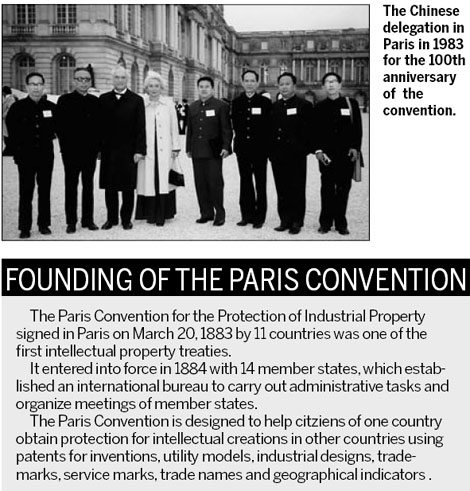25 years of intellectual property protection
Editor's note: This year is the 25th anniversary of China's joining the Paris Convention for the Protection of Industrial Property. Zhao Yuanguo, a participant in the historic event, recalls the reasons for and results of the nation's accession to the global pact.
In 1973, Ren Jianxin, then deputy director of the China Council for the Promotion of International Trade (CCPIT), proposed to the State Council that China join the Paris Convention.
In 1978 China decided to establish a patent system. The committee drafting the law believed it was necessary to join the Paris Convention to implement a patent system and at the same time create a better environment for the country's reforms and opening-up.
Our patent system aims to not only help attract advanced foreign technologies but also support Chinese proprietary technologies as they go abroad and join the international patent family.
The draft patent law was made in accordance with Paris Convention principles from the very beginning, providing a solid foundation for China's entry into the convention afterwards.
On March 12, 1984 the fourth meeting of the Standing Committee of the Sixth National People's Congress adopted the Patent Law, which took effect on April 1, 1985.
Soon after, the China Patent Office and Trademark Office drafted a request to join the Paris Convention.
The final report, submitted to the State Council for approval, noted that China should enter into the Paris Convention as soon as possible to better achieve its opening-up policy, as well as promote exchanges and cooperation with other countries in intellectual property and create a more friendly environment for implementing laws on patents and trademarks.
China already met requirements for accession to the Paris Convention, the report said. It outlined four specific reasons why China must join the convention:
To increase trust and ease foreign concerns about investment or transfer of advanced technology to China.
To more efficiently protect international intellectual property. Otherwise China had to sign bilateral agreements on patents with scores of countries.
To play a bigger role in international organizations. The Paris Convention is a major component of international intellectual property protection, with many of WIPO treaties and agreements only open to convention members.
To exchange patent documents with member countries and receive the latest technological information in time and free of charge.
The State Council approved the report and signed the document, which was submitted to the Standing Committee of the National People's Congress on November 1, 1984.
On November 13, the meeting adopted the proposal.
After related procedures, China officially joined in the Paris Convention on March 19, 1985, becoming the 96th member country.

(China Daily 03/24/2010 page17)














